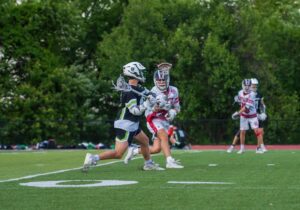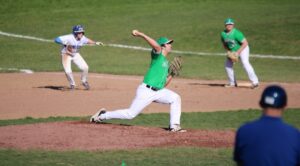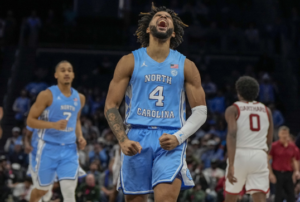
OPINION
Should varsity and junior varsity athletes be allowed to opt out of physical education classes? I’m not the first person to pose that question — nor will I be the last — yet for some frustrating reason it never seems to be legitimately addressed by our school board.
Here’s my background: I’ve been a runner at Irvington High School for all three seasons, every year of my time spent here. My practices tend to run from 3:30 to 5:30 at the latest. On weekends I go to meets that can last for hours, and then usually run on Sundays to stay in shape. On weekdays during what could be an off period, I have mandatory participation in sports (on the more ridiculous end) such as yoga, scooter handball, scooter hockey, pickleball, and badminton.
So whenever I hear a faculty or board member talk about how they want to help students deal with the unending stresses of high school, I have an inclination to slam my schedule out in front of them and violently circle “physical education” until they get the hint.
The knee-jerk reaction one normally gets when presenting this argument goes along the lines of “well, you can’t really do much to change anything; it’s New York law!”
The logic all makes sense, why wouldn’t we have gotten rid of this policy yet if there weren’t some legal barrier? Well, allow me to put my foot in that proverbial door with this quote ripped directly from the FAQ section of New York State law:
“In general, schools are encouraged to provide opportunities for students to participate in athletic teams in addition to completing their required PE courses. However, students in grades 10–12 who have demonstrated acceptable levels of physical fitness, skills, and knowledge of PE activities through achievement of the commencement-level PE learning standards, as determined by the principal and physical education staff, may receive PE credit for participation in an extra class or after-school athletic program if such a program meets the equivalent of the instructional time requirements per semester.”
An off period when I normally have physical education would be the epitome of a “quick fix” to the problem of dealing with the pressures of varsity sports. So what argument is so compelling to keep me from having that little bit of extra time to study or even just relax? Well, the best arguments I’ve heard so far go as such:
- Varsity athletes are important role models
- Students should be able to play sports alongside ALL of their peers
- It is important to learn a variety of sports and health skills rather than just focusing on one.
And of course there is the cream-of-the-crop best argument against my free time:
‘It is important for other students to realize that just because someone is good at one sport they do not excel at all the rest.’
If you notice that all of these arguments sound ludicrous, you are not alone. If you thought they sounded fair and legitimate, I’d say there’s a good chance that you are NOT a student at IHS who participates in a varsity sport.
Was it ever the case that a varsity athlete was fair and instructive with his/her peers about the sports that are played in gym? Maybe during rare situations. Does it sound more accurate that if the athlete did take much of a leadership role, it ended more often in him/her being a ball hog and carrying the entire team on their back?
And the argument for physical education is being informative on wider health issues and how to stay healthy and fit further in life. Well, there is around a two-day unit on that, with a test in the end that doesn’t matter for much. All I can remember from it is the difference between cardiovascular and muscular fitness, which I can assure you has not once ever motivated me to get out and exert myself.
Most of the goals the board thinks they’re accomplishing by having physical education be mandatory are not actually effective. What you are doing by placing me in a mandatory class is adding to the things I have to deal with during this hectic, college-focused time of my life. Anything and everything I had to learn in gym was already taught to me by the end of freshmen year (the course repeats itself, if you weren’t aware).
There is one argument I heard when I interviewed Mr. McCormack that sounded legitimately appealing to me as a college applicant:
“What puts [students who are applying to schools] apart from the rest is their time management. The fact that they are able to manage their time during the day while playing four varsity sports,” said he said. “The colleges look at that.”
That’s a fair point, and it could be true. On the other hand, it could be false. And let’s be honest, it’s not really likely that PE time management is a deciding factor in college admissions.
I’m not one to criticize without attempting to cause positive change, so I posted a petition. Within one night it had 122 backers, and that is from the limited selection of community members I am friends with on Facebook. This petition has not been enough to sway the school, and I have been told I need more support to change the school’s philosophy.
But what does a school’s philosophy matter, when its taxpayers and students don’t subscribe to the same one? I’ve heard of students as well as parents e-mailing the administration demanding the time off from PE for their overworked students, and every student I spoke to seems to side with me in this debate (and believe me, I’ve spoken to a lot of people).
By way of dissenting opinions, I had a short interview with gym teacher Ms. Devaney. When asked if the gym curriculum could be covered in one year, she said, “It is a building curriculum. You build your character over time.” She thinks gym should be mandatory all years regardless of sport participation.
Student Remy Mermelstein, who is not a varsity athlete, disagrees. “[Athletes] spend two hours after school every day doing ‘real’ gym.”
He said, “They shouldn’t have to participate in it during school, that’s stupid.”
And take student Brian Lenz, who is a hardworking member of the IHS cross country program. He, like many others, lacks a lunch period. How? How could PE be argued for as anything but unhealthy if it means that a student doesn’t have a period he otherwise could use to eat?
I have no quarrels with any Irvington faculty members, I think in many other cases they have heard student perspective and helped greatly to enrich the community. However on this issue I find there is a disconnect between the faculty and students. If you want to debate me on this, you can find me in gym 7th period every B day.









Be First to Comment